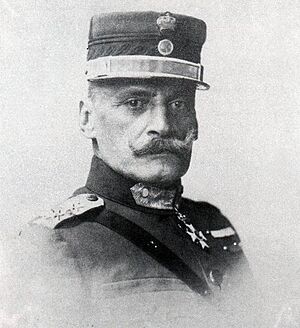Anastasios Papoulas facts for kids
Quick facts for kids
Anastasios Papoulas
|
|
|---|---|

Anastasios Papoulas c. 1920-22
|
|
| Native name |
Αναστάσιος Παπούλας
|
| Born | 1/13 January 1857 Missolonghi, Kingdom of Greece |
| Died | 24 April 1935 (aged 78) Athens, Kingdom of Greece |
| Allegiance | |
| Service/ |
|
| Years of service | 1878–1920 1920–1922 |
| Rank | |
| Commands held | Army of Asia Minor Athens Police |
| Battles/wars |
|
| Awards | |
Anastasios Papoulas (born January 1, 1857 – died April 24, 1935) was an important Greek general. He is best known for leading the Greek army during much of the Greco-Turkish War from 1919 to 1922. At first, he strongly supported the king. Later, he changed his views and supported the republicans. He faced serious consequences in 1935 for his involvement in a failed attempt to change the government.
Early Life and Military Career
Anastasios Papoulas was born in Missolonghi, Greece, on January 1, 1857. He joined the Greek Army in 1878.
He fought in the Greco-Turkish War of 1897. This was a short war between Greece and the Ottoman Empire. After this, he worked as the head of police in Athens.
During the Balkan Wars (1912–1913), Papoulas led the 10th Infantry Regiment. These wars were important for Greece. They helped Greece gain more land.
Commander in the Greco-Turkish War
After the Balkan Wars, Papoulas continued to serve in high military positions. However, in 1917, he was removed from the army. This happened because he supported the king during a time of political division in Greece, known as the National Schism.
In November 1920, a new government that supported the king came to power. Papoulas was called back to duty. He was made the commander-in-chief of the Greek forces in Anatolia. This army was called the Army of Asia Minor. He took over from another general, Leonidas Paraskevopoulos.
Papoulas led the army against the Turkish nationalists. He commanded the Greek forces in several important battles:
- The First Battle of İnönü in early 1921.
- The Second Battle of İnönü in spring 1921.
- The Greek summer offensive of 1921, which included the Battle of Kütahya–Eskişehir and the Battle of Sakarya.
After these battles, the Greek army had to retreat. On May 19, 1922, Papoulas was removed from his command. This was because he disagreed with the government about how to continue the war. He then retired from active military service.
Later Life and Political Involvement
After the war ended in 1922, Papoulas changed his political views. He became a strong opponent of the monarchy (the rule by a king). He supported the Second Hellenic Republic, which was a government without a king. He also supported the politician Eleftherios Venizelos.
In March 1935, Papoulas was one of the leaders of a failed attempt to change the government. This was a pro-Venizelos coup attempt. Because the attempt failed, he was captured. Anastasios Papoulas was later executed for treason on April 24, 1935, in Athens.

